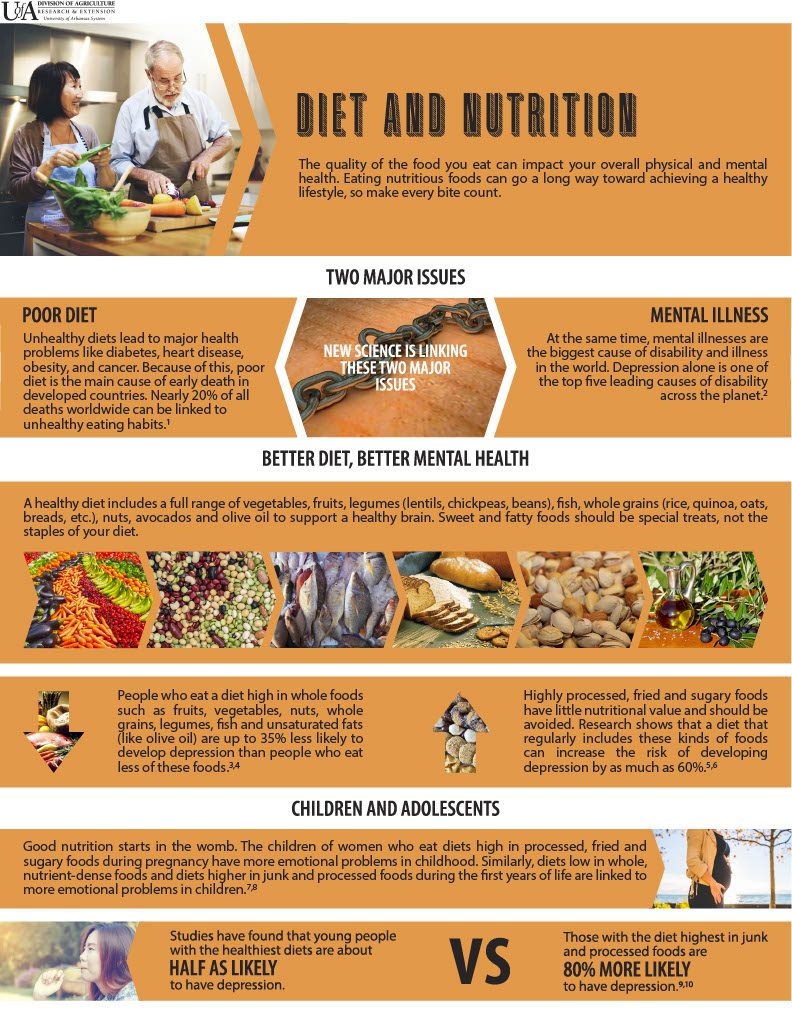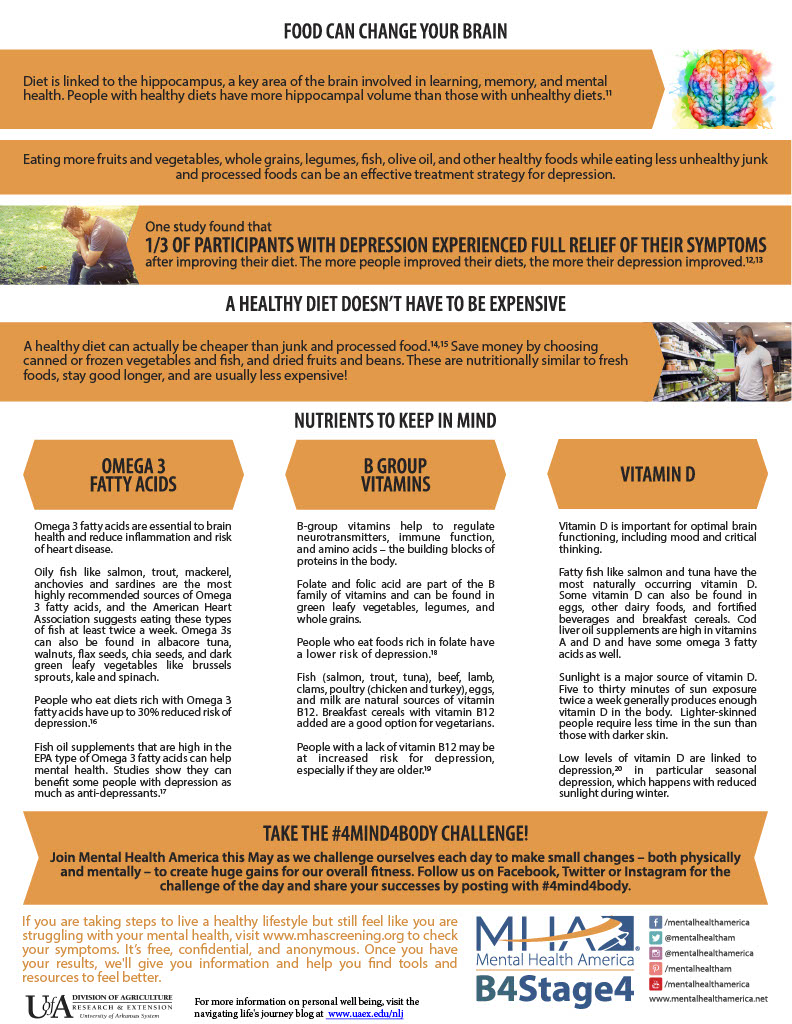
Navigating Life's Journey Blog
Helping others navigate this journey of Life!
A weekly blog from the Family & Consumer Sciences Department
Mental Health Month: Diet and Nutrition
The quality of the food you eat can impact your overall physical and mental health. Eating nutritious foods can go a long way toward achieving a healthy lifestyle, so make every bite count.
Two Major Issues
 Poor Diet
Poor Diet
Unhealthy diets lead to major health problems like diabetes, heart disease, obesity, and cancer. Because of this, poor diet is the main cause of early death in developed countries. Nearly 20% of all deaths worldwide can be linked to unhealthy eating habits.
Mental Illness
At the same time, mental illnesses are the biggest cause of disability and illness in the world. Depression alone is one of the top -ve leading causes of disability across the planet.
Better Diet, Better Mental Health
A healthy diet includes a full range of vegetables, fruits, legumes (lentils, chickpeas, beans), fish, whole grains (rice, quinoa, oats, breads, etc.), nuts, avocados and olive oil to support a healthy brain. Sweet and fatty foods should be special treats, not the staples of your diet.
People who eat a diet high in whole foods such as fruits, vegetables, nuts, whole grains, legumes, -sh and unsaturated fats (like olive oil) are up to 35% less likely to develop depression than people who eat less of these foods.
Highly processed, fried and sugary foods have little nutritional value and should be avoided. Research shows that a diet that regularly includes these kinds of foods can increase the risk of developing depression by as much as 60%.
Children and Adolescents
Good nutrition starts in the womb. The children of women who eat diets high in processed, fried and sugary foods during pregnancy have more emotional problems in childhood. Similarly, diets low in whole, nutrient-dense foods and diets higher in junk and processed foods during the first years of life are linked to more emotional problems in children.
Food Can Change Your Brain
Diet is linked to the hippocampus, a key area of the brain involved in learning, memory, and mental health. People with healthy diets have more hippocampal volume than those with unhealthy diets.
- Eating more fruits and vegetables, whole grains, legumes, fish, olive oil, and other healthy foods while eating less unhealthy junk and processed foods can be an effective treatment strategy for depression
- One study found that 1/3 of participants with depression experienced full relief of their symptoms after improving their diet. The more people improved their diets, the more their depression improved.
A Healthy Diet Doesnt Have to Be Expensive
A healthy diet can actually be cheaper than junk and processed food. Save money by choosing canned or frozen vegetables, and dried fruits and beans. These are nutritionally similar to fresh foods, stay good longer, and are usually less expensive!
Nutrients to Keep in Mind
Omega 3 Fatty Acids
- Omega 3 fatty acids are essential to brain health and reduce inammation and risk of heart disease.
- Oily fish like salmon, trout, mackerel, anchovies and sardines are the most highly recommended sources of Omega 3 fatty acids, and the American Heart Association suggests eating these types of fish at least twice a week. Omega 3s can also be found in albacore tuna, walnuts, ax seeds, chia seeds, and dark green leafy vegetables like brussels sprouts, kale and spinach.
- People who eat diets rich with Omega 3 fatty acids have up to 30% reduced risk of depression.
- Fish oil supplements that are high in the EPA type of Omega 3 fatty acids can help mental health. Studies show they can benefit some people with depression as much as anti-depressants.
B Group Vitamins
- B-group vitamins help to regulate neurotransmitters, immune function, and amino acids – the building blocks of proteins in the body.
- Folate and folic acid are part of the B family of vitamins and can be found in green leafy vegetables, legumes, and whole grains.
- People who eat foods rich in folate have a lower risk of depression.
- Fish (salmon, trout, tuna), beef, lamb, clams, poultry (chicken and turkey), eggs, and milk are natural sources of vitamin B12. Breakfast cereals with vitamin B12added are a good option for vegetarians.
- People with a lack of vitamin B12 may be at increased risk for depression, especially if they are older
Vitamin D
- Vitamin D is important for optimal brain functioning, including mood and critical thinking.
- Fatty -sh like salmon and tuna have the most naturally occurring vitamin D.Some vitamin D can also be found in eggs, other dairy foods, and forti-ed beverages and breakfast cereals. Cod liver oil supplements are high in vitamins A and D and have some omega 3 fatty acids as well.
- Sunlight is a major source of vitamin D. Five to thirty minutes of sun exposure twice a week generally produces enough vitamin D in the body. Lighter-skinned people require less time in the sun than those with darker skin.
- Low levels of vitamin D are linked to depression, in particular seasonal depression, which happens with reduced sunlight during winter.
TAKE #UAEX4MIND4BODY CHALLENGE!
Join UAEX and Mental Health America this May as we challenge ourselves each day to make small changes-both physically and mentally-to create huge gains for our overall fitness. Follow us in Facebook or Twitter for the challenge of the day and share your success by posting with #uaex4mind4body.
If you are taking steps to live a healthy lifestyle but still feel like you are struggling with your mental health, visit www.mhascreening.org to check your symptoms. It’s free, confidential, and anonymous. Once you have your results, we'll give you information and help you and tools and resources to feel better.
Reference: Mental Health America

